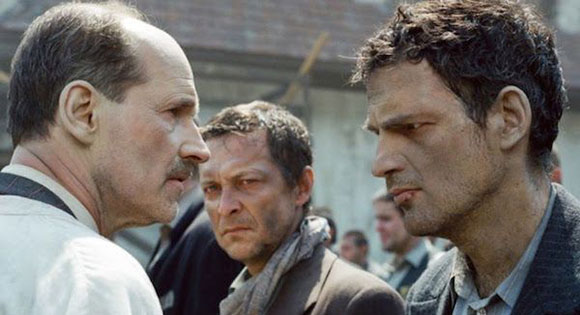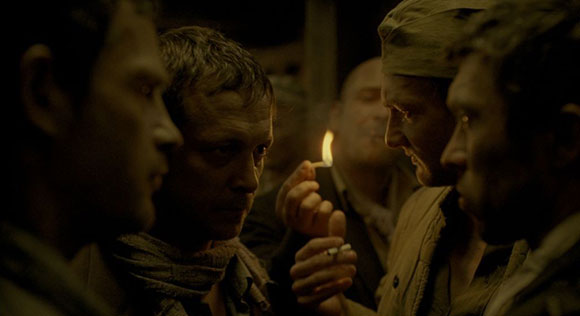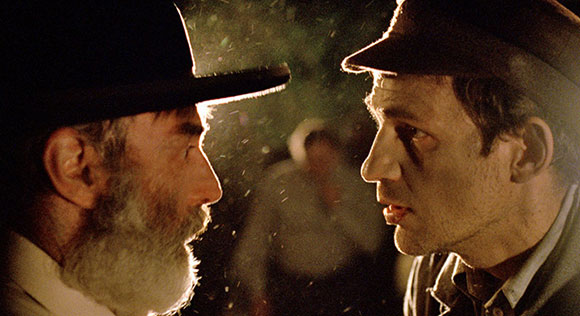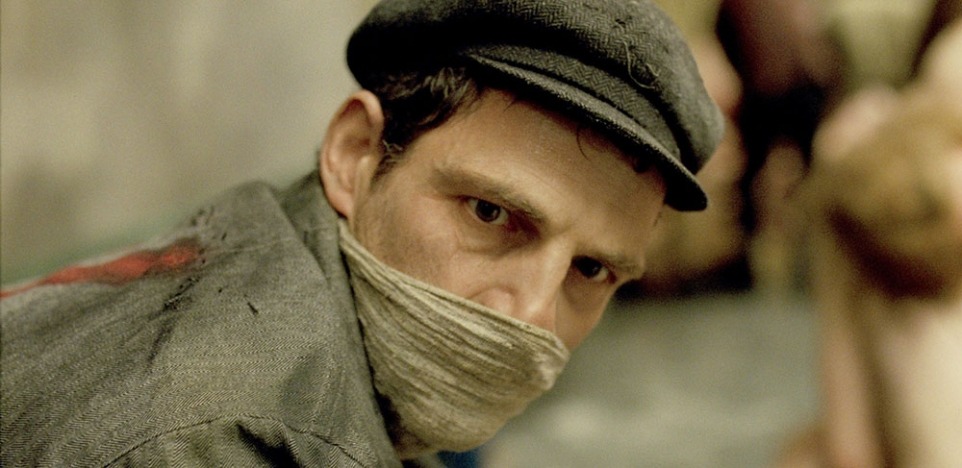In this incredibly intense and deeply focused film the time is October, 1944, and the setting is the Auschwitz-Birkenau concentration camp. In the opening scene of this immersive drama, we see a deliberately out of focus shot which eventually yields a close-up of Saul Auslander (Geza Roohrig), a Hungarian prisoner who wears a jacket with a gigantic X marked upon its back.
For the rest of the film, the camera stays with him as he performs a series of grisly tasks as a one of the Sonderkommandos, who are known as the "bearers of secrets." He is required to accompany frightened Jews to rooms where they undress and are told that they will be assigned to various work units once they have completed their showers. After they are herded into the gas chambers and the doors are shut, Saul and his co-workers hear the shouts, screams, and commotion of the dying Jews. They gather up the left-behind clothes, searching for money and other valuables, then drag the corpses from the rooms (German camp officials refer to them as "pieces") and scrub the blood and other human debris from the floors.

After a gassing, Saul witnesses a boy being pulled alive out of the room. He watches as the youth, who is gasping for air, is suffocated by a doctor who wants perform an autopsy on him to discover what allowed him to survive. Saul is convinced that the boy is his son and he becomes a man-with a mission -- to secure a proper burial for him overseen by a rabbi who recites the Kaddish.
As he tries to fulfill this redemptive act of mercy, he cannot escape the continuing killings going on around him. On a night when the gas chambers are packed, Jews from arriving transports are shot at point blank and shoved into pits. We also witness crematorium ashes being shoveled into a river. Saul's obsession with giving the boy a proper burial is viewed by his fellow Sonderkommandos as a rebuff of their plans for an escape; they have learened that they have all been scheduled for execution. One of them says to Saul: "You failed the living for the dead."

After seeing so many Holocaust movies over the years, we did not expect to see one that radically reframed the genre. Laszlo Nemes, in his feature film debut, has done just that with his creative treatment of one man's experience of working in the death houses of Auschwitz-Birkenau. Saul's mission provides the spiritual meaning and zeal he needs to survive the fierce death and destruction going on around him.
Nemes keeps the camera of cinematographer Matyas Erdely tightly focused on Saul so we experience what he experiences. And through the astonishing work of sound designer Tamas Zanyi we hear the cacophony of noise in these death factories along with the shouts of the German overlords as they attend to their dirty business. There has never been and probably will never be a Holocaust film that speaks so directly to audience's sense of hearing.

Son of Saul, which won the Grand Prix of the Cannes 2015 Jury, is a claustrophobic and difficult film to sit through, but for all those who yearn to see something very different, it is well-worth experiencing, given its razor sharp treatment of one man's mission of mercy and its many technical cinematic triumphs.
